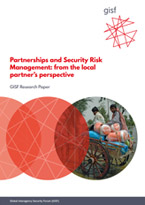 Global Interagency Security Forum (GISF)
Global Interagency Security Forum (GISF)
Overview: The research and drafting of this paper occurred before the spread of COVID-19. Whilst the researchers couldn’t have foreseen the effects of the pandemic, the findings and lessons provided in this paper appear all the more relevant in the current context.
Movement restrictions, repatriation of international staff, difficulties in maintaining aid delivery, as well as high degrees of uncertainty about future travel, have generated a renewed focus on localisation. The current crisis is a ripe moment to analyse the failures of the localisation agenda and to improve practices. One of the central issues to be addressed is the lack of consideration for local aid workers’ security.
COVID-19 is one among the many threats local and national NGOs (L/NNGOs) deal with, and one among many obstacles they face when assisting populations in need. Local NGOs and communities have always been the first responders to humanitarian crises and the last remaining afterwards. While they take most of the safety and security risks associated with such operations, they seldom receive adequate support from international partners (such as INGOs, UN agencies and donors).
